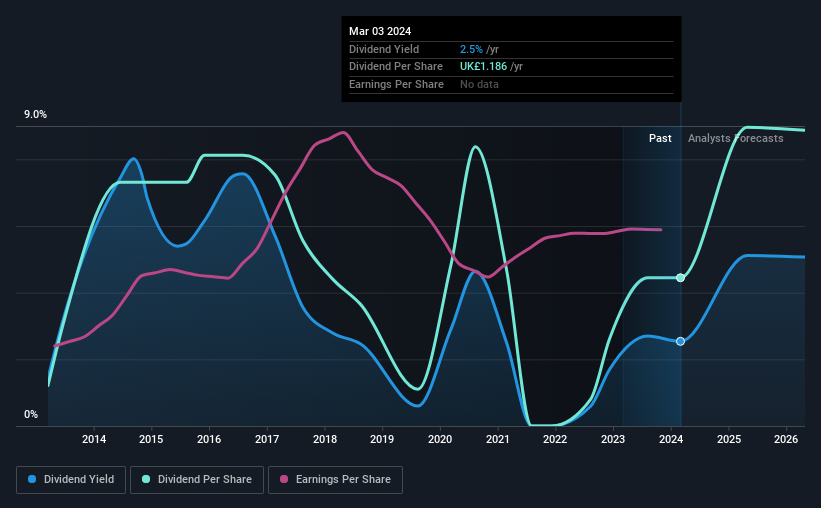Only Three Days Left To Cash In On Berkeley Group Holdings' (LON:BKG) Dividend
The Berkeley Group Holdings plc (LON:BKG) stock is about to trade ex-dividend in 3 days. Typically, the ex-dividend date is one business day before the record date which is the date on which a company determines the shareholders eligible to receive a dividend. The ex-dividend date is of consequence because whenever a stock is bought or sold, the trade takes at least two business day to settle. Thus, you can purchase Berkeley Group Holdings' shares before the 7th of March in order to receive the dividend, which the company will pay on the 29th of March.
The company's upcoming dividend is UK£0.33 a share, following on from the last 12 months, when the company distributed a total of UK£1.19 per share to shareholders. Last year's total dividend payments show that Berkeley Group Holdings has a trailing yield of 2.5% on the current share price of UK£46.70. Dividends are a major contributor to investment returns for long term holders, but only if the dividend continues to be paid. As a result, readers should always check whether Berkeley Group Holdings has been able to grow its dividends, or if the dividend might be cut.
See our latest analysis for Berkeley Group Holdings
If a company pays out more in dividends than it earned, then the dividend might become unsustainable - hardly an ideal situation. Berkeley Group Holdings paid out just 14% of its profit last year, which we think is conservatively low and leaves plenty of margin for unexpected circumstances. A useful secondary check can be to evaluate whether Berkeley Group Holdings generated enough free cash flow to afford its dividend. Dividends consumed 52% of the company's free cash flow last year, which is within a normal range for most dividend-paying organisations.
It's encouraging to see that the dividend is covered by both profit and cash flow. This generally suggests the dividend is sustainable, as long as earnings don't drop precipitously.
Click here to see the company's payout ratio, plus analyst estimates of its future dividends.
Have Earnings And Dividends Been Growing?
When earnings decline, dividend companies become much harder to analyse and own safely. Investors love dividends, so if earnings fall and the dividend is reduced, expect a stock to be sold off heavily at the same time. Berkeley Group Holdings's earnings per share have fallen at approximately 7.5% a year over the previous five years. Ultimately, when earnings per share decline, the size of the pie from which dividends can be paid, shrinks.
Another key way to measure a company's dividend prospects is by measuring its historical rate of dividend growth. Berkeley Group Holdings has delivered an average of 14% per year annual increase in its dividend, based on the past 10 years of dividend payments.
The Bottom Line
From a dividend perspective, should investors buy or avoid Berkeley Group Holdings? Its earnings per share have been declining meaningfully, although it is paying out less than half its income and more than half its cash flow as dividends. Neither payout ratio appears an immediate concern, but we're concerned about the earnings. To summarise, Berkeley Group Holdings looks okay on this analysis, although it doesn't appear a stand-out opportunity.
With that being said, if dividends aren't your biggest concern with Berkeley Group Holdings, you should know about the other risks facing this business. Every company has risks, and we've spotted 2 warning signs for Berkeley Group Holdings (of which 1 shouldn't be ignored!) you should know about.
A common investing mistake is buying the first interesting stock you see. Here you can find a full list of high-yield dividend stocks.
Have feedback on this article? Concerned about the content? Get in touch with us directly. Alternatively, email editorial-team (at) simplywallst.com.
This article by Simply Wall St is general in nature. We provide commentary based on historical data and analyst forecasts only using an unbiased methodology and our articles are not intended to be financial advice. It does not constitute a recommendation to buy or sell any stock, and does not take account of your objectives, or your financial situation. We aim to bring you long-term focused analysis driven by fundamental data. Note that our analysis may not factor in the latest price-sensitive company announcements or qualitative material. Simply Wall St has no position in any stocks mentioned.

